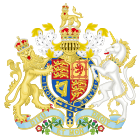- Obscene Publications Act 1857
-
Obscene Publications Act 1857 
Parliament of the United KingdomStatute book chapter 20 & 21 Vict. c.83 Territorial extent England and Wales, Ireland Dates Royal Assent 1857 Repeal date 29 August 1959 Other legislation Repealing legislation Obscene Publications Act 1959 Status: Repealed The Obscene Publications Act 1857 (20 & 21 Vict. c.83), also known as Lord Campbell's Act or Campbell's Act, was a major piece of obscenity legislation in the United Kingdom of Great Britain and Ireland. For the first time, it made the sale of obscene material a statutory offence, giving the courts power to seize and destroy offending material.
Contents
Origins
Prior to this Act, whilst the "exposure for sale" of "obscene books and prints" had been made illegal in law,[1] the publication of obscene material was treated as a common law misdemeanour[2] and effectively prosecuting authors and publishers was difficult even in cases where the material was clearly intended as pornography.
The origins of the Act itself were in a trial for the sale of pornography presided over by the Lord Chief Justice, Lord Campbell, at the same time as a debate in the House of Lords over a bill aiming to restrict the sale of poisons. Campbell was taken by the analogy between the two situations, famously referring to the London pornography trade as "a sale of poison more deadly than prussic acid, strychnine or arsenic",[3] and proposed a bill to restrict the sale of pornography; giving statutory powers of destruction would allow for a much more effective degree of prosecution.
The bill was controversial at the time, receiving strong opposition from both Houses of Parliament, and was passed on the assurance by the Lord Chief Justice that it was "...intended to apply exclusively to works written for the single purpose of corrupting the morals of youth and of a nature calculated to shock the common feelings of decency in any well-regulated mind."
The House of Commons amended the bill to exclude Scotland, on the grounds that Scottish common law was sufficiently stringent.
Provisions of the Act
The Act provided for the seizure and destruction of any material deemed to be obscene, and held for sale or distribution, following information being laid before a "court of summary jurisdiction" (a Magistrates' Court). The Act required that following evidence of a common-law offence being committed — for example, on the report of a plain-clothes policeman who had successfully purchased the material — the court could issue a warrant for the premises to be searched and the material seized. The proprietor then would be called upon to attend court and give reason why the material should not be destroyed.
Critically, the Act did not define "obscene", leaving it to the courts to devise a test, based on the common law.
Later developments
Main article: Hicklin testWhilst the Act itself did not change, the scope of the work affected by it did. In 1868 Sir Alexander Cockburn, Campbell's successor as Lord Chief Justice, held in an appeal that the test of obscenity was "...whether the tendency of the matter charged as obscenity is to deprave and corrupt those whose minds are open to such immoral influences and into whose hands a publication of this sort may fall." This was clearly a major change from Campbell's opinion only ten years before — the test now being the effect on someone open to corruption who obtained a copy, not whether the material was intended to corrupt or offend.
Cockburn's declaration remained in force for several decades, and most of the high profile seizures under the Act relied on this interpretation.
In both 1959 and 1964, acts were passed in England and Wales with the same title as the 1857 act. As of 2008 these latter two Obscene Publications Acts are still in force, albeit as amended by more recent legislation.
Notes
- ^ Originally by the Vagrancy Act 1824; subsequently extended by the Vagrancy Act 1838, the Metropolitan Police Act 1839 and the Town Police Clauses Act 1847
- ^ From the precedent set by R. v. Curl (1729) following the publication of Venus in the Cloister
- ^ Perhaps the earliest known appearance of this ever-popular analogy; compare "I would rather give a healthy boy or a healthy girl a phial of prussic acid than this novel", describing The Well of Loneliness in 1928
Bibliography
- Craig, A (1937). The Banned Books of England. London.
United Kingdom legislation Pre-Parliamentary legislation Acts of Parliament by states preceding
the Kingdom of Great BritainActs of the Parliament of England to 1483 · 1485–1601 · 1603–1641 · Interregnum (1642–1660) · 1660–1699 · 1700–1706
Acts of the Parliament of Scotland
Acts of the Parliament of Ireland to 1700 · 1701–1800Acts of Parliament of the
Kingdom of Great Britain1707–1719 · 1720–1739 · 1740–1759 · 1760–1779 · 1780–1800
Acts of Parliament of the United Kingdom of
Great Britain and Ireland and the United
Kingdom of Great Britain and Northern IrelandChurch of England Measures Legislation of devolved institutions Acts of the Scottish Parliament
Acts and Measures of the Welsh Assembly
Acts of the Northern Ireland Assembly / of the Northern Ireland Parliament
Orders in Council for Northern IrelandSecondary legislation Categories:- Obscenity law
- Censorship in the United Kingdom
- United Kingdom Acts of Parliament 1857
Wikimedia Foundation. 2010.

